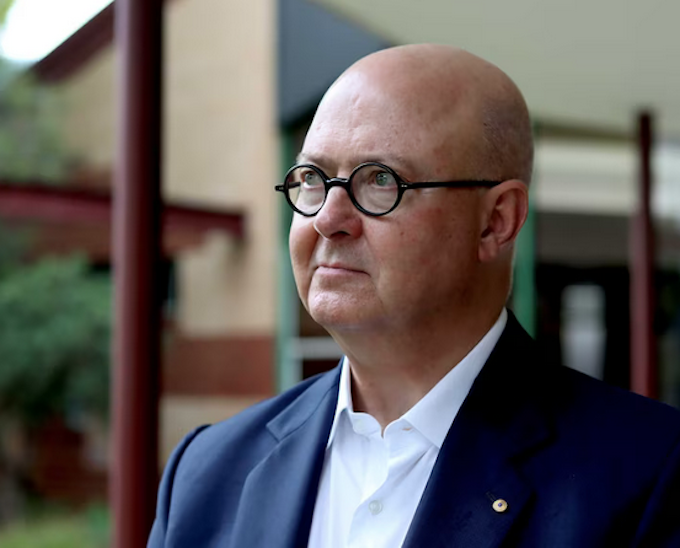
ANALYSIS: By Denis Muller, The University of Melbourne
ABC chair Kim Williams has attracted considerable attention with his criticism of the broadcaster’s online news choices. Williams has taken issue with what he sees as the ABC prioritising lifestyle stories over hard news.
In the process, he has raised an important issue of principle.
Is it right for the chair to insert himself into editorial decision-making, even at the level of broad direction, as here?
Generally speaking, the answer would be no.
To see why, it is necessary only to look back to the chaotic period in 2018 when a former chair, Justin Milne, inserted himself into editorial decision-making because of concerns that the reporting of some ABC journalists was upsetting the government and thereby imperilling the ABC’s funding.
That debacle ended with the resignation not just of Milne but of the then managing director, Michelle Guthrie, leaving a sudden vacuum of leadership and a nervous newsroom.
It is therefore risky for Williams to take a step down this path.
However, the weakness of ABC news leadership requires that something be done.
This weakness has a moral as well as a professional-practice dimension.
A risky path to follow. Video: ABC News
The moral dimension is demonstrated by the treatment of high-profile staff such as Stan Grant and Laura Tingle, and of less well-known but still valued journalists such as ABC Radio Victoria’s Nicole Chvastek, and Sydney radio’s Antoinette Lattouf. All of these journalists, in various ways, have fallen victim to the ABC’s propensity to buckle under external pressure.
The professional-practice dimension is demonstrated not just by the online performance criticised by Williams but by the prioritising of police-rounds stories over far bigger issues on the evening television bulletin, and by occasional spectacular failures such as the attempt to link the late NSW Premier Neville Wran with Sydney’s Luna Park ghost train fire.
The standing of the ABC’s best journalism — programmes such as Four Corners and Radio National’s Background Briefing — is undermined by these systemic failures.
However, indicating his preference for hard news over lifestyle stories will get Williams only so far. It lies within his power and that of the board to do what ought to have been done long ago if the ABC is serious about strengthening its news service: separate the roles of managing director and editor-in-chief.
Having them in the one person creates an inherent conflict that has nothing to do with the integrity of the individual occupying the position, but everything to do with the core responsibilities of the two jobs.
The managing director, as a board member, is responsible for the overall fortunes of the ABC. This includes its financial fortunes and its relationship with its most important stakeholder, the federal government.
An editor-in-chief’s first responsibility is not to these considerations at all, but to the public interest. That requires above all the creation of a safe space in which ABC journalists can do good journalism without looking over their shoulders to see if they are going to be the next target of an attack from a politician (Chvastek), a lobby group (Antoinette Lattouf), or News Corporation (Grant and Tingle).
The Stan Grant controversy. Video: The Guardian
It also requires the imposition of rigorous editing processes to see that stories are properly verified, accurate and fair, regardless of the standing or wilfulness of the staff involved, and that the stories deal with issues of substance.
And in the case of Lattouf, the focus shifts to the public interest in the impact on money and morale of the prolonged legal proceedings over her sacking.
She was removed from a temporary role on ABC Sydney radio for posting on Instagram a report by Human Rights Watch, in which it was alleged that Israel was using starvation as a weapon of war in Gaza.
The ABC argued unsuccessfully in the Fair Work Commission that she had not been sacked. Subsequently Lattouf made an offer to settle for $85,000 in damages and her old role back. However, the ABC has not accepted this and instead is now involved in a further legal dispute, this time in the Federal Court, over whether due process was followed in sacking her.
Fair Work Commission finds Antoinette Lattouf was sacked by ABC. Video: ABC News
This is causing consternation in Canberra, where the Senate standing committee on environment and communications has asked the ABC how much this action is costing.
The ABC has supplied the committee with the amount but it has not been made public.
It is a textbook case of how a strong editor-in-chief who was not the managing director would act in this situation. A reporter would be assigned to find out the amount, since it is clearly a matter of public interest, and a well-connected press gallery journalist would get it without too much trouble.
ABC management would then be asked to comment, and a story containing the amount and any ABC comment would be broadcast on the ABC.
A managing director has a conflicting responsibility: to do all he or she can to protect the corporate interests of the ABC, so the amount remains secret.
Meanwhile, the ABC gives rival news organisations the chance to scoop the ABC on its own story, leaving its news service looking even weaker.![]()
Dr Denis Muller, senior research fellow of the Centre for Advancing Journalism, The University of Melbourne. This article is republished from The Conversation under a Creative Commons licence. Read the original article.













































